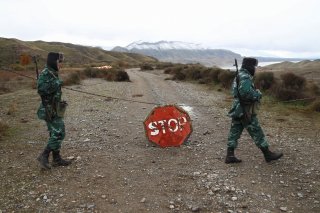Why Turkey and Azerbaijan Won’t Get a Corridor Across Armenia
If Turks hope to enjoy unhampered trade with Central Asia all the way to the Chinese border, then Armenians in Artsakh should enjoy the same unhampered trade through Turkey all the way to France or the United Kingdom.
It has now been one year since Armenia and Azerbaijan accepted a ceasefire ending the forty-four-day war between Azerbaijan and Artsakh, the unrecognized Armenian state in Nagorno-Karabakh. The war left Artsakh as a rump state and saw Armenia return Azerbaijani districts that it had occupied during the first war with Azerbaijan shortly after the Soviet Union’s fall. The agreement, published on the Kremlin website, also allowed Russia to insert nearly 2,000 troops as peacekeepers between the two sides and called for an exchange of prisoners of war and other hostages. The final clause declared:
All economic and transport connections in the region shall be unblocked. The Republic of Armenia shall guarantee the security of transport connections between the western regions of the Republic of Azerbaijan and the Nakhchivan Autonomous Republic in order to arrange unobstructed movement of persons, vehicles and cargo in both directions. The Border Guard Service of the Russian Federal Security Service shall be responsible for overseeing the transport connections.
In recent months, however, Turkish president Recep Tayyip Erdoğan and Azerbaijani President Ilham Aliyev have sought to redefine the clause in two important ways. Firstly, they interpret it as granting them a corridor that will bisect sovereign Armenian territory. Secondly, they ignore the first sentence that seeks to unblock economic and transport connections across the region. The Biden administration should make clear such reinterpretation is unwarranted and illegitimate.
Initially, there was optimism among Turks and in Central Asia that vehicular traffic from Nakhchivan, an Azerbaijani exclave separated from the rest of Azerbaijan by Armenia’s Zangezur corridor, could revive the moribund economy in eastern Turkey and expand trade and tourism across Central Asia. Aliyev’s cocky belligerence soon quashed that possibility. “The creation of the Zangezur corridor fully meets our national, historical, and future interests. We will be implementing the Zangezur corridor, whether Armenia wants it or not,” he said earlier this year on Azerbaijan's state-controlled television. That Secretary of State Antony Blinken certified that Azerbaijan had committed itself to diplomacy and eschewed military force just two days after Aliyev made his threat demonstrates either State Department incompetence or a deliberate violation by Blinken of the Freedom Support Act.
Regardless, Turkey supported Aliyev’s bluster. Turkey’s official state-run television channel blamed Joseph Stalin who, while People’s Commissar for Nationalities, awarded Zangezur to Armenia, which the channel claimed was until then Azeri. The irony here, of course, is that Stalin had similarly transferred Nagorno-Karabakh, historically Armenian territory, to Azerbaijan. By laying claim to Zangezur, the Turkish and Azeri governments undermine the legitimacy of Aliyev’s claims to Nagorno-Karabakh. A subsequent Turkish article argued, “The Zangezur Corridor was the most important clause in favor of Azerbaijan and Turkey,” no matter that the ceasefire agreement called for a transport link rather than a formal corridor.
Erdoğan addressed the issue with more finesse than his Azeri partner. He said that any meeting with the Armenian leader to discuss ending Turkey’s blockade of Armenia required first fulfilling Azerbaijan’s demands. “God willing, the problem between Azerbaijan and Armenia will be overcome with the opening of the corridors,” Erdoğan said in September. When Armen Grigoryan, secretary of the Security Council of Armenia, acknowledged in October that Armenian roads could be open to Azerbaijani and Turkish traffic albeit under Armenian control and without a loss of sovereignty, Aliyev again allowed his triumphalism and expansionism to get in the way of a pragmatic solution. Speaking at a joint news conference with Erdoğan, Aliyev said, “Both Turkey and Azerbaijan will take necessary steps for the realization of the Zangezur Corridor… to unite the entire Turkic world."
Both President Joe Biden and Blinken have repeatedly declared that “diplomacy is back,” but when it comes to the South Caucasus, it is absent. This is unfortunate because there is a real opportunity to promote peace within the region and advance American interests. A common refrain among the State Department’s unofficial Turkey lobby and beneficiaries of Azerbaijan’s “caviar diplomacy” is that Azerbaijan is a better ally to the United States than Armenia because of Yerevan’s ties to both Moscow and Tehran. Put aside that, in reality, Azerbaijan’s ties to Russia and Iran have grown exponentially over recent years. If Washington’s goal was to scale back Armenia’s ties to Russia and Iran, then the best way forward would be to pressure Turkey and Azerbaijan to lift their double blockade of Armenia in order to reduce Armenian dependence upon Russia and Iran. Turkey should open its borders to Armenian trade as should Azerbaijan. While Turkey hopes its trucks could drive through Zangezur to Armenia, Armenian vehicles should likewise be able to drive from Yerevan to Istanbul. If Turks hope to enjoy unhampered trade with Central Asia all the way to the Chinese border, then Armenians in Artsakh should enjoy the same unhampered trade through Turkey all the way to France or the United Kingdom.
Aliyev made a mockery of the Section 907 waiver allowing U.S. assistance to the autocratic petrostate. It is time to revoke the waiver until the Azeri dictator proves his commitment to peace and diplomacy by opening Azerbaijan’s borders to Armenian trade. Likewise, if Blinken truly wants to encourage peace in the region, he should recall newly appointed Jeffrey Flake, the U.S. ambassador to Turkey, and direct him to return to Ankara only when he can drive there from the Armenian capital.
Michael Rubin is a resident scholar at the American Enterprise Institute, where he specializes in Iran, Turkey, and the broader Middle East. He also regularly teaches classes at sea about Middle East conflicts, culture, terrorism, and the Horn of Africa to deployed U.S. Navy and Marine units. You can follow him on Twitter: @mrubin1971.
Image: Reuters.

